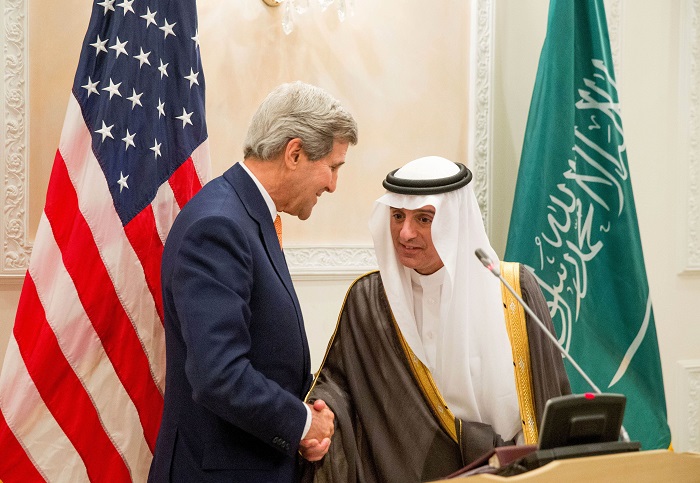Alwaght- The lack of any considerable military outlook for continuation of the Saudi Arabian attacks on Yemen, the heavy costs of war in a time that the oil prices are sagging, as well as rising human rights groups' criticism of the role of the US weapons in Saudi war crimes in Yemen have pushed Washington to seriously seek diplomatic ways to move Riyadh out of the quagmire of Yemen war, as at the same time the US Secretary of State John Kerry has talked about a new plan for to end Yemen conflict. The Yemeni activists, however, are pessimistic about success of the US peace plan just like the earlier peace negotiations.
Meeting his Saudi counterpart Adel al-Jubeir on Thursday in Jeddah, Saudi Arabia, the US Secretary of State has said that there was no military solution for the Yemeni crisis, adding details about the new plan to find settlement in Yemen. Adding more details, John Kerry said that the plan came as part of efforts for making a comprehensive reconciliation in Yemen, and that in first steps it included immediately forming a national unity government and retreatment of the forces from the capital city of Sana'a and other key regions of the country and also handing over all of the heavy arms including ballistic missiles and the launching bases that are in the hands of Ansarullah movement and its allies to a third party.
Meanwhile, talking to the Al-Mayadeen news network in Dubai, the spokesman for the US State Department has said that the details of the new peace plan would be completed in the upcoming days as the diplomatic negotiations go ahead with the UN.
Forming the national unity government and disarming Ansarullah are actually key demands of Saudi Arabia but what appears new in Kerry's words is handover of the arms to a third party. Hesham al-Omeysi, the Yemeni political activist and commentator from Sana'a has said that the Ansarullah movement has already opposed the suggestions of the US.
“It is promising to talk about a third party, but who is the third party, Oman or the UN," the Yemeni activist wondered.
Meanwhile, Haykal Bafana, the prominent Yemeni political activist, has said that the new American plan carried nothing new, asserting that the plan was simply a waste of time.
The officials of Ansarullah movement haven't yet reacted officially to the new US plan, but a member of the movement has told the media that Ansarullah would examine details of the peace initiative.
According to Alhurra news website of Yemen, Abdul-Malik al-Ajari, the member of Nasrallah's political council, has said that words of the US Secretary of State John Kerry were different in comparison to the earlier positions of the international community and were worth scrutinizing. Al-Ajari asserted that Ansarullah would publicize its official stances on the new plan after looking at all details. He said that the suggestions have essentially been improved.
Saudi Arabia formed a coalition of the Arab countries and, while having a full Western backing, especially by Britain and the US, brought Yemen under its unceasing airstrikes in March 2015. But after 500 days not only the Saudis failed to make remarkable success but also they are witnessing their southern areas being counter-attacked continuously by the Yemeni forces.
On Thursday, the Ansarullah-run Al-Masirah TV network aired images provided by the Yemeni forces near Saudi Arabia's Najran province showing destroying of the Saudi military equipment and also fleeing of the Saudi troops from their posts. These battlefield conditions have caused the analysts to talk about military defeat of Saudi Arabia in the war.
Thomas Lippmann, an American author and journalist who focuses on relations of the US and Saudi Arabia, has said that the key goal of Riyadh was to restore to power the resigned government of Abd Rabbuh Mansour Hadi and adopt the UN Security Council’s resolution 2216 which demanded Ansarullah to hand over their arms. He told National Interest website that the problem of Saudi Arabia was that those goals of Riyadh could not be bombed and actually they were achievable by no means.
On the other side, the war on Yemen has imposed heavy costs on Saudi Arabia. According to the published reports, Riyadh is facing a critical financial conditions due to the high war spending and sharp drop of oil prices.
The Business Insider website in a report that focused on severe economic conditions of Saudi Arabia has written that the situation was so dire that Saudi Arabia for the first time eyed using the international bonds to raise cash.
The consequences of Yemen war, however, not only affect Saudi Arabia but also they directly jeopardize the global credit of the Americans. In past few days some of the American politicians as well as the international organizations have lashed out at the US for backing the Saudi aggression against Yemen. In a latest case, a mix of 20 Democrat and Republican members of the US Senate in a letter to the US President Barack Obama have expressed objection to US arms sales and new contracts for delivery of military equipment to Saudi Arabia. The American congressmen in their letter have touched upon massacring of the Yemeni civilians by the Saudi Arabian army and called for US administration to halt weapons sales to Al Saud regime.
These conditions have caused the media to describe the recent diplomatic moves of John Kerry an effort by Washington to take Riyadh out of the dire straits in Yemen.
Referring to the new US initiative, Kuwait's daily of Al Rai wrote that the plan does not primarily want to settle the Yemeni conflict, rather, it is an attempt to pull Saudi Arabia and its allies out of the Yemen quagmire that created catastrophic outcomes during the past 17 months and yielded no tangible achievements for the kingdom.



























